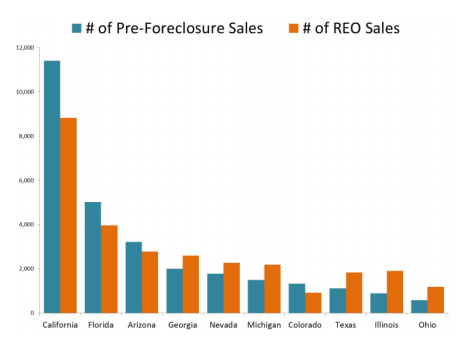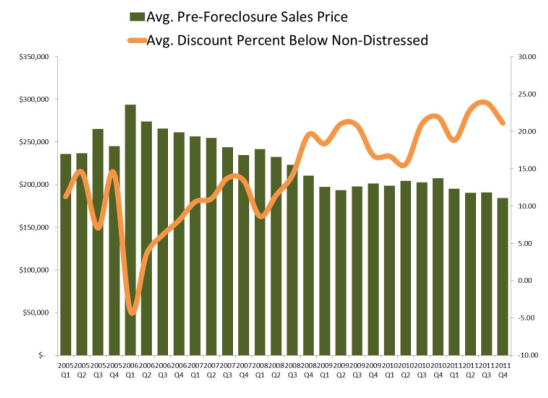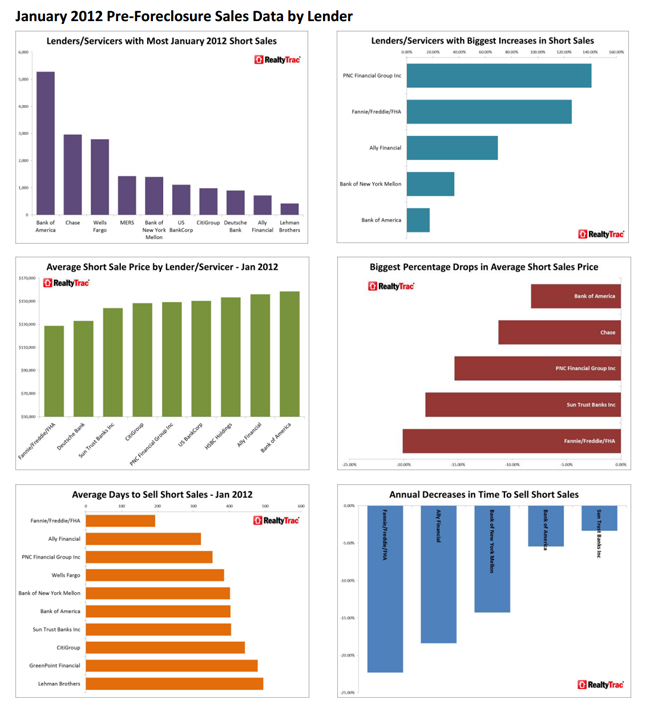"A change is afoot when it comes to short sales," RealtyTrac said on Thursday, releasing new data which indicate, based on January's numbers, that pre-foreclosure sales (most of which are so-called short sales) in the first quarter were the highest since the first quarter of 2009.
In theory, the company said, a short sale has long been viewed as an "elegant solution" to the nation's foreclosure problem. A short sale, in which the lender accepts less money than it is owed, provides a win-win-win for the buyer, bank, and even the seller. "The buyer purchases a house they want at a price they can afford, the bank gets the best price for its distressed asset, and the seller walks away from a mountain of debt, free to get a fresh start."
Short sales, however, have never lived up to their hype. Pre-foreclosure sales rose in late 2008 and early 2009, reaching a peak of 128,000 in early 2009 but then there was a sharp drop and since the second quarter of 2009 through the end of 2011, pre-foreclosure sales have averaged about 89,500 per quarter.
However, in January there were more than 35,000 pre-foreclosure sales nationwide, 33 percent more than one year earlier, which puts these sales on track to reach over 105,000 for the quarter. The January figure follows December sales of more than 37,000 indicating that January was not an anomaly. In addition there have been even larger increases in some states, for example in Georgia where pre-foreclosure sales were up more than 100 percent on an annual basis and California, Massachusetts and Michigan, Utah, South Carolina, and Wisconsin all of which had increases of over 50 percent.
Sales of bank-owned real estate (REO) have always been higher than pre-foreclosure sales, but that gap is narrowing. In January there were only about 2,500 more REO sales nationwide than pre-foreclosure sales and in 12 states pre-foreclosure sales outnumbered REO sales in January. In other states the gap between the two sales types is narrowing, indicating, RealtyTrac says, that lenders are viewing short sales more favorably when compared to foreclosing and marketing the resulting REO.

It also appears that lenders are pricing pre-foreclosure sales more aggressively. The average price of a PF sale property nationwide was $184,211 in the fourth quarter of 2011, down 3.45 percent from the third quarter and 11.26 percent lower than the fourth quarter of 2010. This trend continued in January when the average price declined again to $174,120.
While it doesn't necessarily follow falling prices, the average discount is rising with an average pre-foreclosure sale selling 21 percent below a home not in foreclosure compared to a 20 percent discount in December and 17 percent a year earlier.

RealtyTrac said that even with lower prices and higher average discounts, lenders are still getting significantly more return from pre-foreclosure sales than from REO, $30,000 on average above the average REO sales prices of $145,597 even with the average 34 percent discount.
The aggressive pricing is not only moving more property, it is moving it more quickly although the process remains painfully slow. During the first quarter of 2007 a short sale took an average of 113 days from the time when the property entered the foreclosure process to the day of sale. That number increased nearly three-fold by the third quarter of 2011 when it hit a peak of 318 days. Now the time line is slowly starting to shrink, ending the first quarter of 2012 at an average of 306 days. Meanwhile the average time to sell REO has stayed consistently below 200 days and ended the last quarter at an average of 178 days.
Bank of America had, by far, the greatest number of short sales in January with over 5,000 sales compared to around 3,000 for both JP Morgan Chase and Wells Fargo. Bank of America also scored the highest returns, averaging a sales price of roughly $160,000; a few thousand higher than second place Ally Financial. The greatest increase in pre-foreclosure sales came from PNC Financial Services where sales soared by 140 percent followed by Fannie Mae and Freddie Mac, up about 125 percent.
Freddie Mac and Fannie Mae had the shortest timeline for pre-foreclosure sales, an average of 200 days. Every other lender/servicer had average sales times over 300 days and more than half over 400 days.
RealtyTrac is predicting that short sales will continue to grow as foreclosure starts were up both nationally and in 31 states in March. As the process of foreclosure it initiated, sellers become more motivated to deal with buyers. There is also a huge pool of underwater homeowners and, even those who are making payments may have to seek a short sale if they want or need to sell their homes in the next five years.








